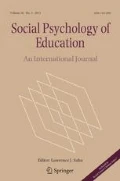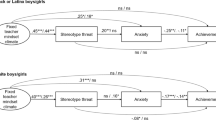Abstract
Children’s academic self-efficacy is one of the strongest predictors of achievement (Wigfield and Eccles, Contemporary Educational Psychology 25(1): 68–81, 2000). The present research examined mathematics self-efficacy and the relationship of racial context from the perspective of two competing bodies of research. Stereotype threat theory would predict that, under conditions where negative stereotypes are salient, self-efficacy would decrease. So, Black/African American students in primarily White classrooms would be predicted to report lower self-efficacy. However, other research suggests that Black/African American students demonstrate fortitude even under disadvantage (e.g., Graham, Review of Educational Research, 64(1): 55–117, 1994). We examined the mathematics self-efficacy of 170 fifth-grade students. In contrast to stereotype threat theory, results suggested that Black/African American students’ self-efficacy remained stable regardless of the racial breakdown of the class. However, White students demonstrated elevated self-efficacy when in predominantly Black/African American classrooms. These results could not be explained by differences in classroom environments. Results are discussed in terms of resilience, ethnic identity and White identity.
Similar content being viewed by others
Abbreviations
- MSLQ:
-
Motivated Strategies for Learning Questionnaire
- MCA:
-
My Class Activities Survey
- MANOVA:
-
Multivariate Analysis of Variance
- ANOVA:
-
Analysis of Variance
- SES:
-
Socioeconomic Status
References
Aronson J., Steele C.M. (2005) Stereotypes and the fragility of academic competence, motivation, and self-concept. In: Elliot A.J., Dweck C.S. (eds) Handbook of competence and motivation. Guilford Publications, New York, pp 436–456
Bandura A. (1986) Social foundations of thought and action: A social cognitive theory. Prentice-Hall, Englewood Cliffs, NJ
Bandura A. (1997) Self-efficacy: The exercise of control. W H Freeman/Times Books/Henry Holt and Co, New York
Bandura A. (2000) Exercise of human agency through collective efficacy, Current Directions in Psychological Science 9(3): 75–78 doi:10.1111/1467-8721.00064
Bandura A. (2006) Toward a psychology of human agency. Perspectives on Psychological Science 1(2): 164–180 doi:10.1111/j.1745-6916.2006.00011.x
Bandura A., Cervone D. (2000) Self-evaluative and self-efficacy mechanisms of governing the motivational effects of goal systems. In: Higgins E.T., Kruglanski A.W. (eds) Motivational science: Social and personality perspectives. Psychology Press, New York, pp 202–214
Bronfenbrenner U. (1979) The ecology of human development: Experiments by nature and design. Harvard University Press, Cambridge, MA
Cullen M.J., Hardison C.M., Sackett P.R. (2004) Using SAT-grade and ability-job performance relationships to test predictions derived from stereotype threat theory. The Journal of Applied Psychology 89(2): 220–230 doi: 10.1037/0021-9010.89.2.220
Eccles J.S., Wong C.A., Peck S.C. (2006) Ethnicity as a social context for the development of African-American adolescents. Journal of School Psychology 44(5): 407–426 doi:10.1016/j.jsp.2006.04.001
Fischer M.J., Massey D.S. (2007) The effects of affirmative action in higher education. Social Science Research 36(2): 531–549 doi:10.1016/j.ssresearch.2006.04.004
Fordham S. (1988) Racelessness as a factor in Black students’ school success: Pragmatic strategy or pyrrhic victory?. Harvard Educational Review 58(1): 54–84
Fordham S., Ogbu J.U. (1986) Black students’ school success: Coping with the ‘burden of acting White’. The Urban Review 18(3): 176–206 doi:10.1007/BF01112192
Freedman-Doan C., Wigfield A., Eccles J.S. (2000) What am I best at? Grade and gender differences in children’s beliefs about ability improvement. Journal of Applied Developmental Psychology 21(4): 379–402 doi:10.1016/S0193-3973(00)00046-0
Gentry M., Gable R.K. (2001) From the student’s perspective—My Class Activities: An instrument for use in research and evaluation. Journal for the Education of the Gifted 24(4): 322–343
Gentry M., Gable R.K., Springer P. (2000) Gifted and nongifted middle school students: Are their attitudes toward school different as measured by the new affective instrument, My Class Activities....? Journal for the Education of the Gifted 24(1): 74–96
Goodenow C., Grady K.E. (1993) The relationship of school belonging and friends’ values to academic motivation among urban adolescent students. Journal of Experimental Education 62(1): 60–71
Gosa T.L., Alexander K.L. (2007) Family (dis) advantage and the educational prospects of better off African American youth: How race still matters. Teachers College Record 109(2): 285–321
Graham S. (1988) Can attribution theory tell us something about motivation in Blacks?. Educational Psychologist 23(1): 3–21. doi:10.1207/s15326985ep2301_1
Graham S. (1994) Motivation in African Americans. Review of Educational Research 64(1): 55–117
Graham S., Long A. (1986) Race, class, and the attributional process. Journal of Educational Psychology 78(1): 4–13. doi:10.1037/0022-0663.78.1.4
Graham S., Weiner B. (1996) Theories and principles of motivation. In: Berliner D.C., Calfee R.C. (eds) Handbook of educational psychology. Macmillan Library Reference, New York, NY, pp 63–84
Grotevant, H. D., & Cooper, C. R. (1988). The role of family experience in career exploration: A lifespan perspective. In P. B. Baltes, D. L. Featherman, & R. M. Lerner (Eds.), Life-span development and behavior (Vol. 8, pp. 231–258). Hillsdale, NJ, England: Lawrence Erlbaum.
Helms J.E. (1993) I also said ‘White racial identity influences White researchers’. The Counseling Psychologist 21(2): 240–243. doi:10.1177/0011000093212007
Helms J.E. (1995) An update of Helms’s White and People of Color racial identity models. In: Ponterotto J.G., Casas J.M., Suzuki L.A., Alexander C.M. (eds) Handbook of multicultural counseling. Sage, Thousand Oaks, CA , pp 181–198
Hong W., Youngs P. (2008) Does high-stakes testing increase cultural capital among low-income and racial minority students?. Education Policy Analysis Archives: 16(6): 1–18
Jacobs J.E., Lanza S., Osgood D.W., Eccles J.S., Wigfield A. (2002) Changes in children’s self-competence and values: Gender and domain differences across grades one through twelve. Child Development 73(2): 509–518. doi:10.1111/1467-8624.00421
Jensen, R. (2005). The heart of whiteness: Confronting race, racism, and white privilege. City Lights Publishers.
Knowles E.D., Peng K. (2005) White selves: Conceptualizing and measuring a dominant-group identity. Journal of Personality and Social Psychology 89(2): 223–241. doi:10.1037/0022-3514.89.2.223
Lubienski S.T. (2002) A closer look at Black-White mathematics gaps: Intersections of race and SES in NAEP achievement and instructional practices data. The Journal of Negro Education 71(4): 269–287. doi:10.2307/3211180
McKay P.F., Doverspike D., Bowen-Hilton D. (2003) The effects of demographic variables and stereotype threat on Black/White differences in cognitive ability test performance. Journal of Business and Psychology 18(1): 1–14. doi:10.1023/A:1025062703113
Meuller C.M., Dweck C.S. (1998) Praise for intelligence can undermine children’s motivation and performance. Journal of Personality and Social Psychology 75(1): 33–52. doi:10.1037/0022-3514.75.1.33
Miller D.B., MacIntosh R. (1999) Promoting resilience in urban African American adolescents: Racial socialization and identity as protective factors. Social Work Research 23(3): 159–169
Mishel L., Roy J. (2006) Rethinking high school graduation rates and trends. Washington, DC, Economic Policy Institute
Morgan S.L., Mehta J.D. (2004) Beyond the laboratory: Evaluating the survey evidence for the disidentification explanation of Black-White differences in achievement. Sociology of Education 77(1): 82–101
National Institutes of Health. (2001). NIH policy on reporting race and ethnicity data: Subjects in clinical research. Retrieved February 27 2007, from http://grants.nih.gov/grants/guide/notice-files/NOT-OD-01-053.html.
Oyserman D., Harrison K., Bybee D. (2001) Can racial identity be promotive of academic efficacy?. International Journal of Behavioral Development 25(4): 379–385. doi:10.1080/01650250042000401
Pajares F. (1996) Self-efficacy beliefs in academic settings. Review of Educational Research 66: 543–578
Pajares F., Kranzler J. (1995) Self-efficacy beliefs and general mental ability in mathematical problem-solving. Contemporary Educational Psychology, 20: 426–443. doi:10.1006/ceps.1995.1029
Perry P. (2001) White means never having to say you’re ethnic: White youth and the construction of ‘cultureless’ identity. Journal of Contemporary Ethnography 30(1): 56–91. doi:10.1177/089124101030001002
Phinney J.S. (1992) The multigroup ethnic identity measure: A new scale for use with diverse groups. Journal of Adolescent Research 7(2): 156–176. doi:10.1177/074355489272003
Phinney J. (1996) When we talk about American ethnic groups, what do we mean?. American Psychologist 51: 918–927
Pintrich P.R., DeGroot E.V. (1990) Motivational and self-regulated learning components of classroom academic performance. Journal of Educational Psychology 82(1): 33–40. doi:10.1037/0022-0663.82.1.33
Pintrich P., Smith D.A., Garcia T., McKeachie W.J. (1993) Reliability and predictive validity of the motivated strategies for learning questionnaire (MSLQ). Educational and Psychological Measurement, 53(3): 801–813. doi:10.1177/0013164493053003024
PUBLIC LAW 107–110—JAN. 8 2002. (2002). Retrieved July 29 2007, from http://www.ed.gov/policy/elsec/leg/esea02/107-110.pdf.
Roberts R.E., Phinney J.S. (1999) The structure of ethnic identity of young adolescents from diverse ethnocultural groups. The Journal of Early Adolescence, 19(3): 301–322. doi:10.1177/0272431699019003001
Rummens J.A. (2003) Conceptualizing identity and diversity: Overlaps, intersections, and processes. Canadian Ethnic Studies 35(3): 10–25
Sackett P.R., Hardison C.M., Cullen M.J. (2004) On interpreting stereotype threat as accounting for African American-White differences on cognitive tests. The American Psychologist, 59(1): 7–13. doi:10.1037/0003-066X.59.1.7
Schunk D.H. (1981) Modeling and attributional feedback effects on children’s achievement: A self- efficacy analysis. Journal of Educational Psychology, 74: 93–105. doi:10.1037/0022-0663.73.1.93
Schunk D.H. (1989) Self-efficacy and achievement behaviors. Educational Psychology Review 1(3): 173–208. doi:10.1007/BF01320134
Schunk D.H. (1995) Self-efficacy, motivation, and performance. Journal of Applied Sport Psychology, 7(2): 112–137. doi:10.1080/10413209508406961
Schunk D.H. (1995) Self-efficacy and education and instruction. In: Maddux J.E. (eds) Self-efficacy, adaptation, and adjustment: Theory, research, and application. Plenum Press, New York, pp 281–303
Schunk D.H., Hanson A.R. (1985) Peer models: Influence on children’s self-efficacy and achievement behaviors. Journal of Educational Psychology, 77: 313–322. doi:10.1037/0022-0663.77.3.313
Schunk D.H., Hanson A.R., Cox P.D. (1987) Peer model attributes and children’s achievement behaviors. Journal of Educational Psychology 79: 54–61. doi:10.1037/0022-0663.79.1.54
Schunk D.H., Pajares F. (2002) The development of academic self-efficacy. In: Wigfield A., Eccles J.S. (eds) Development of achievement motivation. Academic Press, San Diegao, CA, pp 15–31
Steele C.M., Aronson J.A. (1995) Stereotype threat and the intellectual test performance of African Americans. Journal of Personality and Social Psychology, 69(5): 797–811. doi:10.1037/0022-3514.69.5.797
Steele C.M., Aronson J.A. (2004) Stereotype threat does not live by Steele and Aronson (1995) alone. The American Psychologist 59(1): 47–48. doi:10.1037/0003-066X.59.1.47
Tajfel, H., & Turner, J. C. (1986). The social identity theory of intergroup behavior. In: S. Worchel & W. G. Austin (Eds.), The psychology of intergroup relations (2nd ed., pp. 7–24). Chicago, Nelson-Hall.
Trimble F.W., Helms J.E., Root M.P. (2003) Social and psychological perspectives on ethnic and racial identity. In: Bernal G., Trimble J.E., Berlew A.K., Leong F.T. (eds) Handbook of racial and ethnic minority psychology. Sage, Thousand Oaks, CA
Wigfield A., Eccles J.S. (2000) Expectancy-value theory of achievement motivation. Contemporary Educational Psychology 25(1): 68–81. doi:10.1006/ceps.1999.1015
Wigfield A., Eccles J.S. (2002) The development of competence beliefs, expectancies for success, and achievement values from childhood through adolescence. In: Wigfield A., Eccles J.S. (eds) Development of achievement motivation. Academic Press, San Diego, CA, pp 91–120
Young C.Y., Wright J.V., Laster J. (2005) Instructing African American students. Education 125(3): 516–524
Zimmerman B.J. (2000) Self-efficacy: An essential motive to learn. Contemporary Educational Psychology 25: 82–91. doi:10.1006/ceps.1999.1016
Author information
Authors and Affiliations
Corresponding author
Additional information
Portions of this research were presented at the American Educational Research Association annual meeting in New York, NY, April, 2008.
Rights and permissions
About this article
Cite this article
Schweinle, A., Mims, G.A. Mathematics self-efficacy: stereotype threat versus resilience. Soc Psychol Educ 12, 501–514 (2009). https://doi.org/10.1007/s11218-009-9094-2
Received:
Accepted:
Published:
Issue Date:
DOI: https://doi.org/10.1007/s11218-009-9094-2



